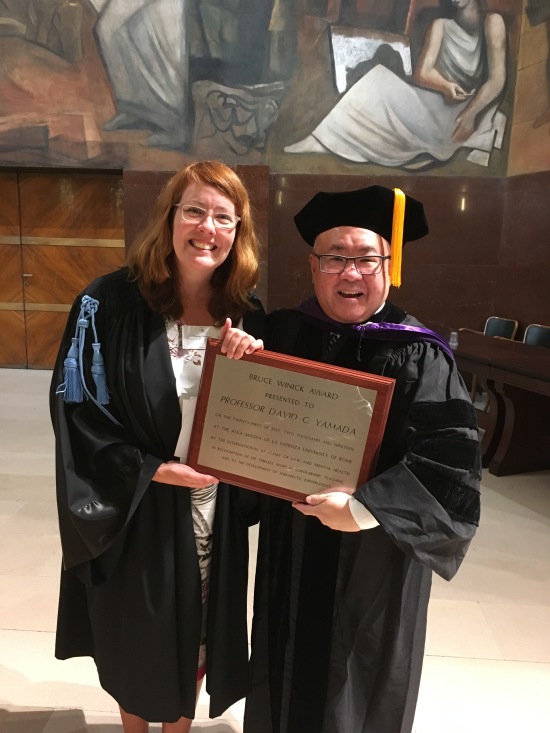
Judge Pauline Spencer of the International Society for Therapeutic Jurisprudence board of trustees introduced me and presented the award
Hello dear readers, during the next week I’ll be at the International Congress on Law and Mental Health in Rome, sponsored by the International Academy of Law and Mental Health. During the conference’s opening ceremonies on Sunday at the Sapienza University of Rome, I received the Bruce Winick Award for contributions to the field of therapeutic jurisprudence (TJ). I was invited to make a short acceptance speech, and I share it with you below.
A bit of background: In 1987, Bruce joined fellow law professor David Wexler to establish the interdisciplinary field of therapeutic jurisprudence, which examines the therapeutic and anti-therapeutic properties of laws, legal systems, and legal institutions. Sadly, Bruce passed away in 2010. But his memory and important writings, plus the ongoing, energetic presence of David Wexler, continue to inspire us. I’ve written about TJ often on this blog, including how it has become a theoretical and philosophical home base for my work on workplace bullying, mobbing, and abuse. In fact, I’ll be talking about this work at a panel discussion later this week.
This conference has served as a sort of global meet-up for the TJ community. In fact, at the 2017 International Congress in Prague, we launched the International Society for Therapeutic Jurisprudence. (Dues are $25 USD for the calendar year; students may join for free!) I’m now concluding my term as the group’s board chair.
Anyway, here’s the speech, in slightly edited form:
***
Bruce Winick Award — Acceptance Remarks — International Congress on Law and Mental Health
David Yamada
July 21, 2019
Ciao a tutti, hi everyone. I want to express my deep gratitude to the International Academy of Law and Mental Health, and to my colleagues in the International Society for Therapeutic Jurisprudence, for nominating and selecting me for this award.
This distinction is especially meaningful because of its namesake, our late friend, Bruce Winick. Bruce co-founded, with David Wexler (another of one of my heroes), the field of therapeutic jurisprudence. But equally important, he was a good soul and a person of exceptional character. I knew Bruce only during the last two years of his life, but throughout that time, he, David, and others, welcomed me with open arms into the TJ community.
In fact, it was around a decade ago that I found myself drawn to TJ, as a mid-career professor. It had finally dawned on me that so much of my work on the legal aspects of workplace bullying and mobbing continually raised questions of psychology and mental health. The 2009 International Congress at New York University, especially, helped me to foster ties with the TJ community and led to friendships that I now regard as lifelong.
As many of you know, Bruce lost his eyesight during his later years. In fact, I recall Bruce at that 2009 NYU conference, sitting in one of the classrooms where sessions were held, often reaching down to affectionately pet Bruno, his loyal friend and service dog.
These warm impressions say a lot about this International Congress on Law and Mental Health. Every time I’m here, the compelling topics and speakers manage to compete mightily with the attractions of the great host cities. Every time I’m here, I make and renew connections with good people. I strongly endorse the adult education and community-building potential of great conferences, and this one stands among the very best.
This 2019 gathering strikes me as having a special significance. Around the world — including in my country — we see authoritarian forces undermining the rule of law and rejecting the values of inclusion, empathy, and compassion. As we scroll through the news headlines on our various devices each day, we may feel like we’re struggling for solutions to these existential threats.
Well, I gently submit that at least some of the answers we seek are in the work that brings us together this week. After all, we know that human dignity and psychological well being are cornerstones of a decent society. We know that psychology, mental health, and other disciplines can shape law and policy to create a better world. We know that kindness and understanding, paired with research and analysis, can be powerful forces for good.
So may I close with a modest suggestion that we use this week to recharge our intellectual batteries, gain new insights and inspirations, and nurture connections with friends and colleagues? And while we’re at it, let’s enjoy some good food and drink, and lots of great sightseeing . . . because after all, we also know that we are in Rome. Grazie, thank you.
Congratulations on this award and your good contributions David!
Reblogged this on Digital learning PD Dr Ann Lawless and commented:
congratulations to David
Congratulations, David! Your work is especially important in these troubled times.
Shelley, thanks for the kind note. I think we’re both looking into stuff that is very much a difficult part of contemporary life. Here’s to us being able to make a difference. Take Care.